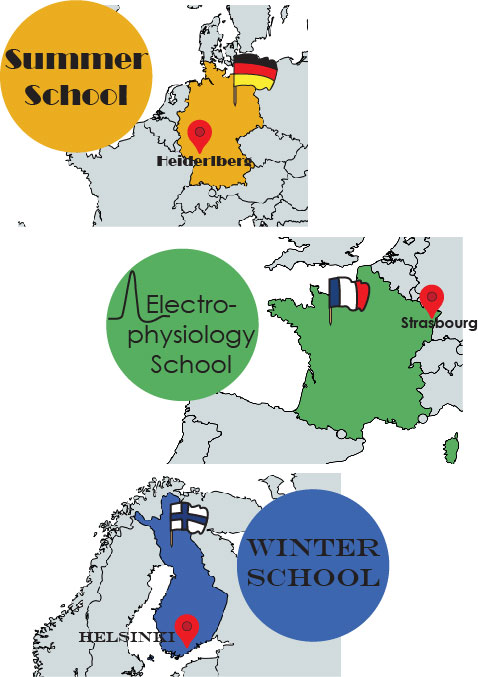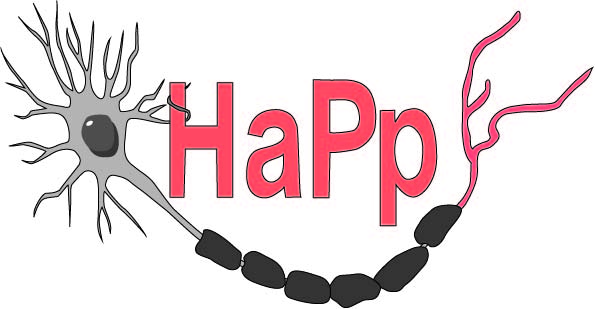Training
The European Joint Doctorate (EJD) programme
The overall training objectives of the EJD HaPpY programme are to equip our 15 ESRs with advanced knowledges in chronic pain and mood disorders, complemented with excellent and ethical research skills. Our goal is also to provide you with knowledge and transferable skills required outside of academic research.
Objective 1/ Training in the core research theme: specific knowledge and know-how
HaPpY will provide ESRs with an optimal training environment to enable them to successfully plan and monitor their individual research project that can be adapted in light of their personal academic background and experience. During their research training, each ESR will be supervised by mentors from academic and non-academic sectors.
All the ESRs will be provided with a series of webinars, given over 3 months and designed to give the recruited ESRs the necessary fundamental and technical (such as neurophotonics) knowledge to work on their own research projects. Lectures will be given by biologists, psychologists, chemists, pharmacologists, behaviourists, clinicians involved in the consortium, providing a multi-disciplinary approach on both pathologies. Trainings in animal experimentation and sensitization on the sex/gender aspects in neurosciences are an important part of our programme as well. Finally, different global events like our Summer School of Pain in Heidelberg, Electrophysiology School in Strasbourg or the Winter School in Mood Disorders in Helsinki will be organized to contribute to our ESRs training programme and participate to this network-wide experience.

Objective 2/ Training in complementary skills necessary for academic and non-academic research
Our Research Integrity module will attune ESRs to the necessity of performing research with integrity, to safeguard the health, welfare and rights of human participants and of laboratory animals included in studies and to afford dignity to the handling and treatment of biological materials. We also consider conveying the ESRs the curiosity to develop a network, establish partnership and work in collaboration with other scientists on a common project. We thus propose a contest where two HaPpY ESRs will have to develop a collaborative virtual project from scratch and write a common proposal to a fictional grant call! In addition, courses on grant proposal writing and scientific presentation will be provided, and ESRs will get insight about application preparation and how to write a successful grant proposal for research. As a training, ESRs will present their project and the results obtained during their project in front of a large audience of experts!
While presenting skills are necessary to clearly disseminate ESRs’ results, listening and grasping the content of others’ presentations is also a must. After each ESR will have presented their data, a “HaPpY Hour” get-together will be organised and each ESR will be randomly assigned 3 slides of another ESR’s talk to present them in front of the audience. The ESRs will be judged on their ability to improvise on someone else’s presentation and explain a project which is not their own.

Objective 3/ Opting out of academic research: an inter-sectorial training
Members of the HaPpY network strongly believe that the vicious cycle between chronic pain and mood disorders should be broken by approaching the problem from angles other than solely the academic research. This is why it is necessary to provide ESRs with skills and knowledge that will allow them to continue, if desired, their career path in another direction.
Opting for a clinical career ? Each ESR will be personally coached during the entire period of their research project by a clinician (e.g. physician, nurse, physiotherapist, psychologist) specialised either in pain or mood disorders. Clinical approach courses will be given both by clinician members of the consortium and patients associations representatives. ESRs will also participate in the organisation of Satellite Symposium to the European Pain Federation Congress. The meeting will gather basic researchers and healthcare professionals across Europe, all involved in pain treatment, management and research.
Opting for working in a company or starting your own? A good way to contribute to the creation and development of therapeutic molecules or devices and to propose new
treatments is to take part in their development process within pharmaceutical and biotech companies. To increase the competences of ESRs in the processes of the private sector, a business coach from one of the industrial partner will be assigned to each student. With our HaPpY BIZ module in Business and Innovation, we will show our ESRs how their ideas or discoveries can be exploited commercially and lead to new projects and entrepreneurial opportunities.
Opting for a career as a decision maker? Through a seminar: “Funding research: what’s behind the scene?”, we wish to give ESRs the keys to understand the research systems, funding and management, in other words, what is behind the scene of the public funded research in different Member States and at the EU level. In addition, during a “Women in Neuroscience” network-wide event, ESRs will learn and propose actions to overcome the female underrepresentation in leadership positions.
Opting for working as a project manager? This training will be conducted by a professional of Neurex with senior track records in the management of national, interregional and European projects and funding. The module will cover: strategic management, professional decision making, the different methodologies for team and project management.
Opting for communication? The ESRs will be trained in the challenging task of presenting their thesis project to a general audience in 3 min in a quick, insightful and clear manner. ESRs will also participate locally to the Brain Awareness Week and give a presentation in a school on a neuroscience related topic.
